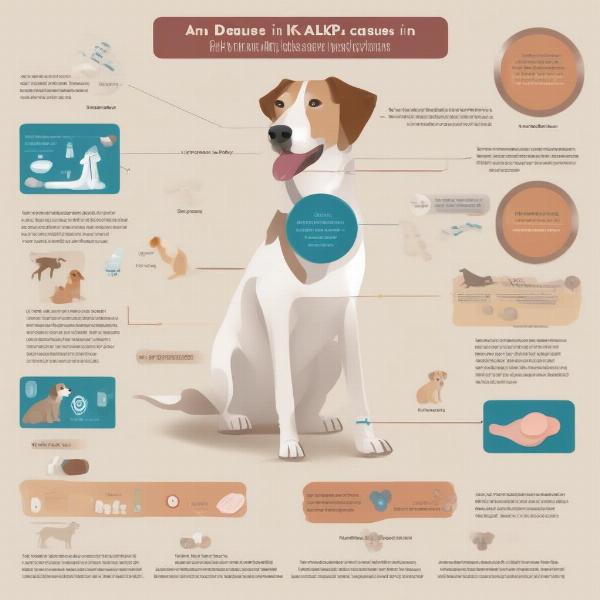Elevated alkaline phosphatase (ALKP) in dogs can be a concerning finding on a blood test, but it’s essential to understand that it’s not a disease in itself. Rather, elevated ALKP in dogs is a marker indicating that something else might be going on in your dog’s body. This article will delve into the causes, symptoms, diagnosis, and treatment options for elevated ALKP levels in dogs, providing you with the information you need to navigate this potential health concern.
What is Alkaline Phosphatase (ALKP) in Dogs?
Alkaline phosphatase is an enzyme found in various tissues throughout a dog’s body, primarily in the liver and bones. While normal levels fluctuate depending on age and breed, significantly elevated ALKP often signals an underlying health issue. Puppies, for example, naturally have higher ALKP due to bone growth. Understanding the cause of the elevation is key to effective management.
Causes of Elevated ALKP in Dogs
Numerous factors can contribute to elevated ALKP in dogs. Some common causes include:
- Cushing’s Disease: This endocrine disorder causes the adrenal glands to overproduce cortisol, leading to a range of symptoms, including increased ALKP.
- Liver Disease: Conditions affecting the liver, such as hepatitis, cirrhosis, or tumors, can cause ALKP levels to rise.
- Bone Disease: Certain bone diseases, such as bone cancer or hyperparathyroidism, can also elevate ALKP.
- Certain Medications: Some medications, particularly corticosteroids and anti-seizure drugs, can induce increased ALKP activity.
- Gallbladder Problems: Obstruction or inflammation of the gallbladder can also lead to elevated ALKP.
 Common Causes of High ALKP Levels in Dogs
Common Causes of High ALKP Levels in Dogs
Symptoms Associated with Elevated ALKP
Because elevated ALKP is a symptom itself, the clinical signs you observe in your dog will depend on the underlying cause. Some potential symptoms include:
- Increased thirst and urination: Often seen in Cushing’s disease.
- Vomiting and diarrhea: Possible signs of liver or gallbladder issues.
- Lethargy and weakness: Can be indicative of various underlying health problems.
- Loss of appetite and weight loss: Common in many chronic diseases.
- Jaundice (yellowing of the skin and gums): A sign of liver dysfunction.
Diagnosing Elevated ALKP in Dogs
Your veterinarian will perform a complete physical examination and recommend further diagnostic tests to determine the underlying cause of elevated ALKP. These tests may include:
- Blood tests: To assess liver and kidney function, as well as other blood parameters.
- Urine tests: To evaluate kidney function and look for other abnormalities.
- X-rays and ultrasounds: To visualize the liver, gallbladder, and bones.
- Biopsy: In some cases, a tissue sample may be needed for definitive diagnosis.
Treatment for Elevated ALKP in Dogs
Treatment for elevated ALKP is directed at the underlying cause. Addressing the primary condition will often result in the ALKP levels returning to normal. Treatment options vary widely depending on the diagnosis and may include medications, surgery, or dietary changes.
FAQ: Elevated ALKP in Dogs
- What is a normal ALKP level in dogs? Normal ALKP levels can vary but generally fall between 23 and 212 U/L. Your veterinarian will interpret the results in context with other blood parameters.
- Is elevated ALKP always serious? Not necessarily. Puppies naturally have higher levels. Mild elevations may also be temporary. However, significant elevations should always be investigated.
- Can diet affect ALKP levels? Yes, a healthy, balanced diet is crucial for overall health and can support liver function.
- How often should ALKP levels be monitored? The frequency of monitoring will depend on the underlying cause and your veterinarian’s recommendations.
- What can I do to help my dog with elevated ALKP? Follow your veterinarian’s recommendations closely, including medication administration, dietary changes, and follow-up appointments.
- Are there any natural remedies for elevated ALKP in dogs? Always consult your veterinarian before using any natural remedies. Some supplements may interact with medications or worsen underlying conditions.
- What is the prognosis for dogs with elevated ALKP? The prognosis depends entirely on the underlying cause. Early diagnosis and treatment are essential for the best outcome.
Conclusion
Elevated ALKP in dogs requires careful investigation to pinpoint the underlying cause. While it can be a concerning finding, it’s important to remember that it’s a marker for another health issue, not a disease in itself. By working closely with your veterinarian and following their treatment recommendations, you can help your dog achieve the best possible outcome.
ILM Dog is a leading international dog website dedicated to providing dog owners with reliable, practical advice on all aspects of dog care and wellbeing. We cover everything from breed selection and puppy care to senior dog care, health, training, nutrition, and more. Our expert content is designed to empower dog owners worldwide with the knowledge they need to provide their furry companions with the best possible care. For further assistance or personalized advice, please don’t hesitate to contact us at [email protected] or +44 20-3965-8624. We at ILM Dog are always here to help.